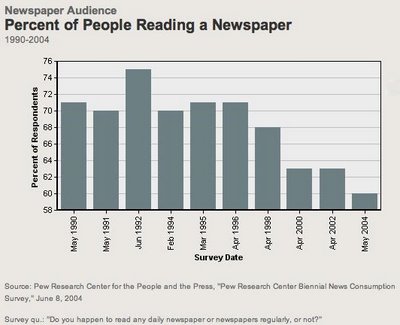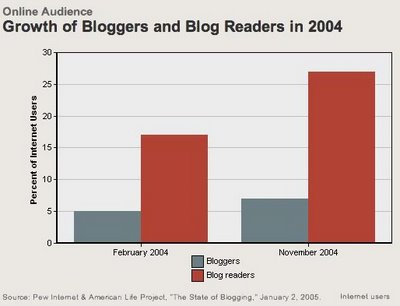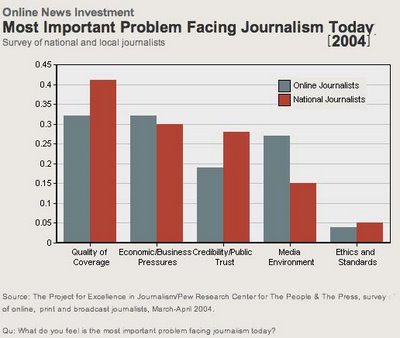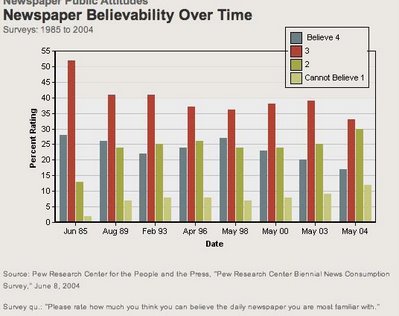Do the Dead Know They Are Dead?
"Newspapers must win online, or face a future of painful contraction." So stated Winning Online - A Manifesto, published in September by Editor & Publisher, a publication that bills itself as America's Oldest Journal Covering The Newspaper Industry. It went on to say, "Newspaper industry leaders are frogs in a pot. The water’s starting to boil, and it’s time to jump. Only 19 percent of 18-34 year olds read a daily newspaper; 44 percent of them go to a web news portal. Broadband penetration has reached 57%. The blogosphere is doubling every 5.5 months. Search provides instant access to the world’s information. User-generated content has turned the authority model of institutional media on its head. Peer-to-peer networks, tag clouds and reputation engines are fundamentally changing how people engage with content and communications." It is obvious that members of the NOW generation, as well as the hightech-savvy among the older generation, are more likely to agree immediately. A reflection of this can best be seen in the many comments the appearance of a portion of the above E&P piece prompted on the blog of Microsoft's Emerging Business Team blogger Don Dodge, after he stated, "In the past I subscribed to Forbes, Fortune, Inc, Red Herring, Venture, Computer World, Computer Reseller News, Byte, and Time. I also subscribed to The Wall Street Journal and my local newspaper. Now I subscribe to none of them. I get my news online." Before you pooh-pooh this as the hollow words of some techie (which Don is most probably not), do pause to think that Microshaft is about money. Its Emerging Business team must be looking hard at trends of all industries to know where to make inroads, where to invest, what to grab, who to target. Bob Walsh, reader of that blog, commented "Like a very bad car accident you drive by slowly, shocked by the blood and gore, there's actually two near-fatalities on the information superhighway today: 1. Traditional journalism. The mood of most newsrooms today is one decidedly gallows humor. There are approximately one half as many reporters in America today as there was a decade ago. Reporters are caught between the desire to glitz up the news, the need to dumb it down for an increasingly undereducated market, and their corporate masters who demand ever-improving profit margins forever and amen. 2. The second casualty is the idea of local. Local hasn't been doing too hot for about the last hundred years, but the Net is providing the final nail in coffin: I have more in common with people in the UK, New York, and hundreds of other places than I have with my next-door neighbors. And I can get a hold them quicker. Newspapers are a sinking ship; the captains of industry still refuse to see the icebergs ahead. The big question is whether reporters are going to go down when the ship, or realize that they no longer need newspapers to do their job." Gerald Buckley, another reader, pitched in with: "I think the model is slowly (and painfully for the print-minded) turning a new, more efficient leaf. Once the print consumers are flushed from our ranks (die or convert) then it will fait accompli." An opposing POV came from someone called LayZ (Hmmm. Could that be the problem?): "...the form factor of an electronic device for reading anything longer than 5-10 minutes is intolerable for me. Nothing will replace the ability to hold a document, periodical, or book in my hand and read it, refer back to it, annotate it. Throw it in the corner for future reference ... And there is no way I'm EVER taking my PC device into the bathroom!" The objections raised by LayZ, will all be sorted out fairly soon ... with digital paper, better form factors, flexible screens, and other technological innovations. Some already have. As Kevin Tofel points out on the same page: "The few magazines I actually still subscribe to are digital editions simply because I can store them without wasting closet space, plus I can annotate them or even clip them with notes into OneNote, Evernote and the like, which makes them searchable."
In wi-fi enabled homes (a fast-growing phenomena, even in our city, as Broadband rates and Wireless Modem costs reduce and more than one member of the family begins to own computers and wants to go online from separate locations), I know several people who do take their laptops to the loo. One customer with a laptop surprised and amused the staff at T2F by asking if the free WiFi (Thank you, MaxCom!) was accessible from the toilet :-)Lest I be accused of relying too much on one kind of source and thought-pool, here's more: Marsha Geller (Editor at Large of iMedia Connection) has been covering the interactive advertising industry for nearly a decade. She quotes a study by the Project for Excellence in Journalism which says that 2005 may go down in history as "the year when journalism in print began to die." Marsha adds that the report base[d] that ominous ruling on events such as newsroom staff cuts, scandals, downward spiraling stock prices, declining circulation, and frustrated investors [...] BTW, if these people sound like near-techies because of their fields of work, do remember that not all techies are anti-newspapers. Visit the post Will the Internet Kill Newspapers for a sampling of views of one such community on the Palm Addict website, where - for example - Kris Gainsforth writes, "Just like books, I don't think that electronic means will replace the newspaper. The tactile feeling of reading a newspaper just cannot be duplicated by a Palm, no matter how cool it is. ;-)" ... and jvburthingy says, "I don't think the internet will kill newspapers. After all, TV didn't kill radio." The State of the News Media 2006 (a very large report but exceedingly readable for anyone deeply interested in the media) has some interesting graphs and charts that tell their own story. Let me share a couple. I have no intention through these graphs, let me hastily add, of turning this into a 'blogs vs. print' debate - already done to death (a trifle too emotionally by the print-supporters) elsewhere on this and many other blogs. That the newspapers (and print journalism, as an obvious corollary) are in big trouble is NOT due to the internet and blogs, alone, for sure. There are countless other factors, two of which can be seen in the next two charts. Warren ("no one has followed the newspaper business as closely as we have for as long as we have—50 years or more.") Buffet, investor and philanthropist (he gave away over 80% of his fortune to the Bill & Melinda Gates Foundation), in a Hypergene interview stated: "People will always want to be entertained and informed. But people just have two eyeballs, and there are only 24 hours in a day. Fifty or 60 years ago, media for most people consisted of the local movie theater, radio, and the local newspaper. Now people have a variety of ways of being informed faster (if not necessarily better), and have more entertainment options, too. But no one has figured out a way to increase the time available to watch entertainment. Whenever more competitors enter a business, the economics of that business tends to deteriorate. Newspapers are still highly profitable, but returns are falling. The size of the audience for network TV is declining. For years, cable TV was thought to operate in its own world, but that’s changing. Few businesses get better with more competitors. The outlook for newspapers is not great." For a while now, some relatively smaller newspapers - more concerned about their future than the giant media conglomerates - are beginning to take note of this phenomena, and articles like Are Newspapers Dying can now be seen voicing such observations as, "Newspaper readership is something of a function of age. If you're 50 or older (hello to all those baby boomers), you're still reading newspapers, and usually four-five days a week. If you're under 50, and definitely if you're under 30, you're a lot less likely to read a newspaper every day of the week. Younger folks turn to the Web, and all of us use multiple media sources for our news and information." (Rockford Register Star). I found Sandy Berger's piece, Newspapers in The Digital World, to be a really interesting read. So far, though, and for a host of reasons - the chief among them being issues of access, lack of local language internet content of any value in countries like ours, the absence of more than a handful of known names writing for the new media (and, even more, of the public being aware of the 'cyber presence' of those who do), coupled with the stop-gap and utterly ludicrous idea of publishing digital look-alike 'copies' of the print edition of major newspapers that use none of the new media's numerous strengths - has kept the waves from drowning the industry. But, in the end, the story of King Canute is worth keeping in mind.
Labels: Bloggers, Media, News, Technology











9 Comments:
This comment has been removed by the author.
26 May, 2007 15:51
This comment has been removed by the author.
26 May, 2007 19:15
Impeccable post, ZAK. Informative and extremely relevant. Although as bloggers we may recognize the trend of switching to blogs as source of current information/news, most of us are not aware of the scope and scale of this change. You're post has expertly addressed that issue.
It would be interesting to get Mr. O. R. Quraishi's take on this post. Perhaps he has some counter-points that could help highlight the 'broadsheet' side of the debate.
26 May, 2007 21:24
ZAK, wonderful and extremely informative piece. I have been following the decline of print media in the US with much interest. Flagship newspapers like the LA Times have been going through gut-wrenching changes for some years now and are on a treadmill of cost cutting. With the exception of family-controlled newspapers (NY Times, Washington Post and the Wall Street Journal) quality print journalism is virtually vanishing in America but even for these "papers of record" the younger and internet savvy readership is moving online. These big names may survive because they are huge consumer brands and are taking the internet very seriously by embracing it but whether they can replace the profitability of the old model is an open question.
I also agree with the way you end the piece. I think there are important differences in the way newspapers face decline in America vs. how they are likely to lose importance in countries like Pakistan. However, I do believe that the eventual dominance of online media is inevitable even though some high quality print media will survive.
27 May, 2007 06:16
@sabizak
agree. there's certainly a space for them. and, considering that the entire paper is almost certainly published from an electronically laid out document, the e-edition is not too troublesome to produce. and there is proprietary software available to do the conversion very neatly.
in fact, i think the digital look alikes (for as long as the print media continues) would also be good as archival material. and if they contain the original ads, also give us an insight into what people were doing/buying at the time. (fyi, some e-papers remove these on the grounds that the advertiser has not paid for additional eyeballs; others, with more business sense, keep some ads that could work over time, too, selling the space again to the advertiser as a hotlink, resulting in additional revenues for both.)
they'd certainly make great gifts: if one could select a specific edition from elecronic archives and send off to someone. imagine getting a bunch of the front pages of the world's top newspapers, for example, showing what was happening around the world on the exact day you were born. (one can get printed editions like this already, for some newspapers ... but the price is, understandably, prohibitive - because stocking or reproduction costs are far too great for physical stuff.
thanks, fawad, for adding your us-based experience. imho the old model's profitability - based hevily on ads - was, partially, a result of the limited number of spaces and ways that the advertisers had to reach an audience via the print media. they have more options now and a variety of ways ... but not proportionately larger budgets. and prosumers actively search for products and product-types online, getting user-reviews for almost everything in the bargain.
olive ream: yes, it'd be good to see orq give us an insight into how things look from a journalist's and the management's side.
27 May, 2007 09:03
I am a bit sceptical about this.
Many moons ago, I learnt to take a lot of things with a pinch of salt. It was when a lot of wise words were spoken and written by 'experts' and backed by a lot of 'data', about a 'revolution waiting to happen', especially, in industries like retail. Somehow, I couldn't seem to agree with them (the reasons are rather too lengthy to go into here).
I often found myself to be the lone voice of dissent at many discussions. However, ultimately, I was proved right and the 'experts' were proved wrong, in spite of the 'research' they had done (whereas I had done none and relied largely on 'gut instinct'), when the dot coms went bust, with a "Boom!" (as in, a loud noise, rather than a stage of an economic cycle).
I mean to say that sometimes the layman (like my own self) can, indeed, make a lot more sense of things than more learned folk.
One reason for my scepticism, in this case, is that this is all too US-centric, whereas the way things shape-up in the not so distant future are likely to be influenced, quite a bit, by economies like India and China.
I've seen a lot of businesses having to almost completely reshape their marketing strategies, on account of a factor as elusive as the 'psychological preferences' of the customer base, when they entered the Indian market, after the economy started opening up.
Also, the 'PC penetration' levels in India and China, the literate populace in rural areas and the popularity enjoyed by vernacular dailies among people who have plenty of purchasing power, but are either internet-illiterate or use it only for communication (email, chat, etc.) or accessing pornography, etc., are among a host of factors that can influence the future.
Then, the 'dumbing down' levels in North America are far higher, it appears, than Europe and, definitely, South Asia.
I guess I've rattled on long enough...
:D
28 May, 2007 13:47
Sidhusaaheb,
Although the trend of switching to the net for sourcing the news may be led by the West, I do believe this trend has now gone global. The shift maybe slow in other parts of the world but it exists.
Post 9-11, the blogosphere has ballooned, not just because of the US and UK but because of other countries in the world. I write for Global Voices Online and I personally have witnessed the interest in and development of international blogsphere.
Alternative news sites and News Aggregator sites have also played a key role in the shift to the net. All major news papers now have a web presence for that particular reason.
Television News channels have also created a strong web presence because of the growing internet audience. Corporations, multi-nationals, financial institutions and government organizations have a web address - they all recognize the need to be online.
For the Asian subcontinent, the internet audience may be small in comparison to the West but it still continues to grow.
Within the educated youth of our own countries who do have access to the internet, the shift to the net for sourcing news is also apparent. India is leading the way in IT. For those employed in this industry, especially the youth, I can make a qualified guess that they are also likely to source the internet for news and information while at work.
Agreed that broadsheet newspaper still remains the major source of news and information within these countries but this does not negate the over-all global growth of blogosphere and or the growing trend of internet as the source of news.
As you indicate, the way things shape-up in the not so distant future are likely to be influenced by India and China, because of their economic dominance. I don't believe that strong global economies of the future are likely to ignore the internet as a growing, alternate medium for news and information, just because of cultural preference. I think it is more likely that growing economies of the future incorporate the internet as a regular if not prominent source of news and information.
Unless some autocratic, unrealistic global internet law which ends up censoring all dissenting political voices or blog commentaries on the net, (which considering the current insufferable global political climate could unfortunately happen), the internet audience for news will continue to grow and yes it will have an adverse influence on the readership of the broadsheet newspaper audience worldwide.
Here ends the lesson. :) Sorry just my humble opinion.
29 May, 2007 00:41
Thanks OA!
:)
09 June, 2007 18:02
My guess is that 'click and mortar' (i.e. online as well as offline presence) is the business model most likely to succeed in this arena too, in the long run, as has been seen in most other lines of business.
09 June, 2007 18:10
Post a Comment
<< Home